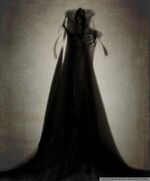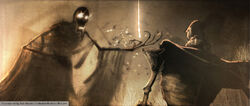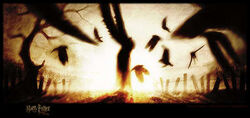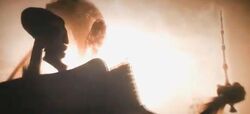
|
Warning!
At least some content in this article is derived from information featured in Hogwarts Legacy. Spoilers will be present within the article. |
- "And Death spoke to them."
- — Death speaking to the Peverell brothers[src]
The being known as Death, or the Spirit of Death, was the embodiment of the universal phenomenon marking the end of physical life, and may or may not have literally existed. The most well-known account of the entity was titled "The Tale of the Three Brothers", and was made famous by Beedle the Bard. According to this story, the three Peverell brothers defied Death by successfully crossing a deadly and dangerous river using magic. Death was outraged because he felt cheated and he could not take the brothers for his own, so he offered to give each of them an artefact of great power. The oldest brother asked for the Elder Wand, the middle sibling requested the Resurrection Stone, and the youngest one chose the Cloak of Invisibility. These items later became known as the Deathly Hallows.[1]
Biography[]
Peverell brothers[]
- "He pretended to congratulate the three brothers upon their magic, and said that each had earned a prize for having been clever enough to evade him."
- — Hermione Granger reading The Tales of Beedle the Bard[src]
Death was a character featured in the last of The Tales of Beedle the Bard, The Tale of the Three Brothers. In the story, the three Peverell brothers (Antioch, Cadmus, and Ignotus) were featured out travelling the world, when at twilight they came to a treacherous river, one that had been known to claim many lives when attempting to cross it. The Peverells, who were powerful wizards, merely whipped out their wands and created a bridge out of thin air, and casually began to cross the river, when they were met by a black hooded figure midway across, blocking their path.[1]

The three Peverell brothers with their "gifts"
This figure was none other than Death himself, who is outraged that he has been cheated out of new victims, due to their magical abilities, and equally enraged that he cannot take them as his own. But Death was cunning and pretended to congratulate the brothers on being powerful enough to elude him, before offering each of them a prize for their skill. When Death made it clear that he would not let the brothers pass across the bridge without him fulfilling each of their personal desires, the wizarding siblings decided to go along with Death's offer, but each for different motives and reasons. Death proceeded to give the Elder Wand, the Resurrection Stone, and the Cloak of Invisibility to each of the brothers, a collection of items that would come to be known in time as the Deathly Hallows.[1]
Revenge[]
- "Then Death stood aside and allowed the three brothers to continue on their way and they did so, talking with wonder of the adventure they had had, and admiring Death's gifts."
- — The Tale of the Three Brothers[src]
Secretly each of these objects was part of an elaborate scheme devised by Death to reclaim each of the brothers as his own. Indeed, as the story progressed, each of the brothers in turn lost his life at the indirect hands of his own gift (Antioch being murdered due to the lust created by the Elder Wand, and Cadmus having committed suicide upon seeing the Resurrection Stone's limitations), restoring to Death's clutches two of his victims.[1]
Ignotus's fate[]
- "But though Death searched for the third brother for many years, he was never able to find him."
- — The Tale of the Three Brothers[src]

"Greeting Death as an old friend, they departed this life as equals."
However, the Cloak of Invisibility enabled Ignotus to elude Death for a good many years, and finally when he had reached a ripe old age and lived a happy, long life, he took off the Cloak, gave it to his son, and departed the "mortal coil" with Death as an old friend, but on his own terms and not those of Death.[1]
Physical description[]
In Beedle the Bard's story, Death was described as an imposing hooded figure - this motif is typical for many depictions of personified death in literature: a skeletal figure garbed in an ancient dark robe, minus the scythe. It was stated in the story that he also has wings that he can retract from his attire as a means of flight so he could stalk on his victims.[1]
Personality and traits[]
- "He was angry that he had been cheated out of three new victims, for travellers usually drowned in the river. But Death was cunning."
- — The Tale of the Three Brothers[src]

Death was portrayed as a character who did not like to be on the losing side of anything. However, as was said in the tale, he was cunning enough to acknowledge the difficulty in claiming the lives of those who could call upon magic to their aid, as the Peverells had done when they summoned the bridge over the river, and because of that, he was willing to pull off a ruse of friendship by offering the brothers their personal desires, intending to use such endeavours for his own ends and beat the brothers in their own game. He was shown to be angered when anyone eluded him, denying him his fresh victims, and he was described as having "grudgingly" given Ignotus his own Cloak of Invisibility, knowing that he had probably been outsmarted by the most humble of the brothers. Despite this however, when Ignotus eventually took off the cloak and revealed himself to Death after attaining a great age, Death apparently greeted him quite amicably, and seemed to no longer bear any grudge against him for having eluded him for so long and even showed no protest when Ignotus decided to pass the cloak over to his son when the original owner could have taken it back.[1]
In both instances, he was described as being agitated when he felt he had been cheated or beaten at his own game; in this case being outsmarted by Ignotus. He was also shown to be a very cunning character, plotting an elaborate scheme using the Deathly Hallows to reclaim each of the brothers for himself.[1]
However, he was not beyond being outwitted, as demonstrated when Ignotus saw through his façade and turned his scheme on its head, by asking for something that would make it impossible for him to be followed by Death.[1]
It was also stated by Ron that Death occasionally got tired after stalking his targets for so long, especially if they saw him coming; which was why he relied on his Cloak of Invisibility to sneak up on them unawares. Contextually, however, this appeared to be a joke.[2]
Magical abilities and skills[]
- "So Death crossed to an elder tree on the banks of the river, fashioned a wand from a branch that hung there, and gave it to the oldest brother."
- — Death[src]

Death giving the Elder Wand to Antioch Peverell
As the embodiment of a natural universal phenomenon that was inevitable to all living beings, Death was incomparably powerful. He was also particularly notable for being the only being (or thing) that Lord Voldemort ever feared.
- Magical manufacturing: As revealed by The Tale of the Three Brothers, Death had the ability to create incredibly powerful magical objects. Examples of other abilities he derived from this province were:
- Wand-making: Death was able to create wands - he created the Elder Wand (the most powerful wand to ever exist) for Antioch Peverell.[1]
- Soul summoning: As there is no true way to resurrect the dead, the very best that Death could do was to summon spirits from beyond the grave - a power that he gave to Cadmus Peverell through the Resurrection Stone.[1] It must also be noted that, though the spirits summoned by the stone would be "much more than ghosts", they were still not truly among the living.
- Invisibility: Death formerly wore a matchless Cloak of Invisibility that enabled him to effectively sneak up on any living thing undetected and unaware, and subsequently claim their life for himself. His invisibility cloak was also dramatically different from all other such cloaks - it would never wear out with age, provided "constant and impenetrable concealment no matter what spells were cast at it", and could completely hide its wearer from even Death himself (the original owner). Indeed, due to his awarding Ignotus Peverell with his own invisibility cloak, Death was unsuccessful in his search for Ignotus, which lasted for many years.[1]
- Tracing: Death was able to track people easily if they were not under supremely powerful magical concealment - he tracked down Antioch and Cadmus to bring them to their deaths, and only failed to do so with Ignotus for many years due to Ignotus's wearing his invisibility cloak.[1]

Death takes flight
Relationships[]
Antioch Peverell[]
- "So the oldest brother, who was a combative man, asked for a wand more powerful than any in existence: a wand that must always win duels for its owner, a wand worthy of a wizard who had conquered Death!"
- — The Tale of the Three Brothers[src]

Antioch receives the Elder Wand from Death
Death was furious when his magical powers were outdone or when he was outsmarted. Therefore he sought revenge upon the Peverell brothers who had eluded him. So when he pretended to have congratulated them and gave them a choice of a prize, Antioch, who was a combative man, decided to humiliate Death by asking for a wand that was worthy of a wizard who had conquered Death. So Death followed him until he stopped to stay at an inn. Antioch then boasted loudly that he had snatched the Elder Wand "from Death himself". Therefore, Death took his life for his own in the form of another murderous wizard who lusted for the Elder Wand's power and killed Antioch to get it.[1]
Cadmus Peverell[]
- "Then the second brother, who was an arrogant man, decided that he wanted to humiliate Death still further, and asked for the power to recall others from Death."
- — The Tale of the Three Brothers[src]
Death was not one to take kindly to losing or being outwitted. Therefore he sought revenge upon the Peverell brothers after their twilight encounter. So when he pretended to congratulate them and gave them a choice of a prize, Cadmus, who was an arrogant man, decided that he wanted to humiliate Death still further, and asked for the power to recall others from death. So Death followed him back to his home, where he attempted to use the Resurrection Stone to bring back his lost lover who had died an untimely death. Sadly, the limitations of Cadmus's gift ended up being his downfall. However delighted he was at first to see the woman he loved, he was dismayed to find that it was only a pale imitation of her: the dead did not truly belong in the living world. In the end, Cadmus killed himself so he could truly join her. Death had taken Cadmus's life for his own just as he had done with Antioch.[1]
Ignotus Peverell[]

Death gives Ignotus the Cloak of Invisibility
Death was furious when he felt he had been outsmarted or eluded when he felt he was due new victims. Therefore he sought vengeance when the Peverell brothers defied him when crossing the fateful river. So when he pretended to congratulate them and gave them each a choice of a prize, Ignotus, who did not trust Death by any means, requested the power to leave that meeting without being followed by Death, rather than ask for something that furthered his own desires. Death, not wishing to betray any hint of his true intentions, begrudgingly took off his Cloak of Invisibility and gave it to Ignotus. Ignotus used the Cloak of Invisibility to hide from Death, successfully eluding him for many years. Finally, when he was an old man and had lived a happy, long life, Ignotus took off the Cloak, passed it on to his son, and went with Death as an old friend, but on his own terms and not those of Death.[1]
Analysis[]
- "...I think it more likely that the Peverell brothers were simply gifted, dangerous wizards who succeeded in creating those powerful objects"
- — Albus Dumbledore's speculation[src]
Albus Dumbledore speculated that the Deathly Hallows were not truly given to the brothers by Death. He completed his reasoning by saying that it was far more likely the brothers were simply very gifted wizards and they succeeded in creating the three objects. It is, however, unproven by anybody either way, although this does remain the most logical answer presented in the story.[4]
Behind the scenes[]
- Assuming he even exists, Death's classification, as a being or otherwise, is unknown, and he probably does not belong to any "species" with members besides himself.
- Death, as a character, appears in numerous other pieces of literature, mythology and other fiction. He is most commonly otherwise known as the Grim Reaper.
- Death strongly resembles a Dementor with its cloak on; whether this is coincidental or not is unknown. It should be noted, however, that the Dementors as designed for the film adaptation of Harry Potter and the Prisoner of Azkaban were based off classic personifications of Death.[5]
- In strong contrast to its portrayal in Harry Potter and the Deathly Hallows: Part 1, Death was portrayed in the 2014 film adaptation of The Tale of the Three Brothers by nine-year-old Emma Campbell, who was dressed in robes of white. This change was the idea of director Brandon Doyden, who wanted the character to look innocent, as to emphasise that Death "isn't necessarily the bad guy".[6]
Appearances[]
- Harry Potter and the Deathly Hallows (First mentioned)
- Harry Potter and the Deathly Hallows: Part 1 (Appears in flashback(s))
- Harry Potter and the Deathly Hallows: Part 1 (video game) (Appears in flashback(s))
- Harry Potter and the Deathly Hallows: Part 2 (Mentioned only)
- The Tales of Beedle the Bard (First appearance)
- Pottermore (Mentioned only)
- Wizarding World (Mentioned only)
- LEGO Harry Potter: Years 5-7
- Harry Potter: The Wand Collection (Mentioned only)
- Harry Potter: Wizards Unite (Mentioned only)
- Hogwarts Legacy
Notes and references[]
- ↑ 1.00 1.01 1.02 1.03 1.04 1.05 1.06 1.07 1.08 1.09 1.10 1.11 1.12 1.13 1.14 1.15 The Tales of Beedle the Bard, "The Tale of the Three Brothers"
- ↑ Harry Potter and the Deathly Hallows, Chapter 21 (The Tale of the Three Brothers)
- ↑ Harry Potter and the Deathly Hallows: Part 1
- ↑ Harry Potter and the Deathly Hallows, Chapter 35 (King's Cross)
- ↑ Harry Potter and the Prisoner of Azkaban (film) - Disc 2 - Creating the Vision
- ↑ J.K. Rowling short story filming at New Portland's wire bridge - Franklin Sun Journal
| Elder Wand | |||
| Death (manufacturer) · Antioch Peverell · Antioch Peverell's killer · Emeric the Evil · Egbert the Egregious · Godelot · Hereward · Barnabas Deverill · Loxias · Arcus or Livius · Mykew Gregorovitch · Gellert Grindelwald · Albus Dumbledore · Draco Malfoy (master only) · Tom Riddle (owner only) · Harry Potter · (Interred) | |||
| Resurrection Stone | |||
| Death (manufacturer) · Cadmus Peverell · (generations of Gaunts) · Marvolo Gaunt · Morfin Gaunt · Tom Riddle · Albus Dumbledore · Harry Potter · (Lost) | |||
| Cloak of Invisibility | |||
| Death (manufacturer) · Ignotus Peverell · Ignotus Peverell's son · Iolanthe Potter · (generations of Potters) · Henry Potter · Fleamont Potter · James Potter I · Albus Dumbledore (owner only) · Harry Potter · James Potter II · Albus Potter | |||


